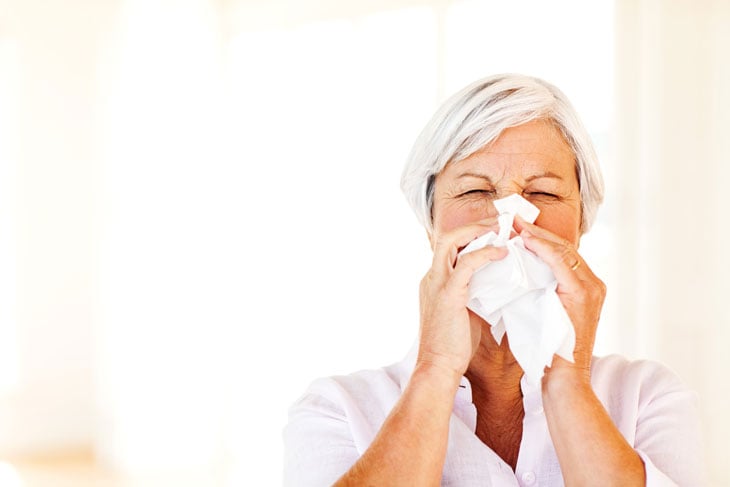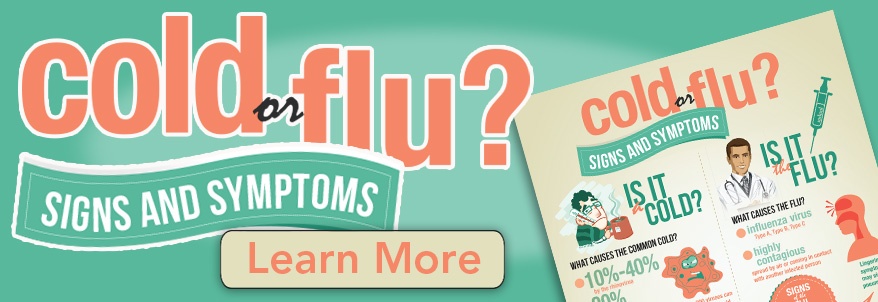
Firing Up for Flu Season: 3 Tips for Flu Prevention in Seniors
As the leaves are falling around us and the temperatures are starting to lower, that means the promise of fall activities and pumpkin spice lattes. What else does this mean? Flu season is upon us.
Those members of society who experience weakened immune systems, including seniors, are at the highest risk for catching the flu and experiencing a more severe version of the illness. Whether you are at a high risk for contracting the flu or not, it is important to take preventive steps to keep yourself and everyone around you safe. Let’s talk about some ways to prepare yourself for flu season.
1. Get the Flu Vaccine
There is a lot of controversy out there on whether or not to get the flu vaccine, but at the end of the day, science stands with practicing this preventative measure to keep all of those in society safe.
The flu vaccine protects people both directly and indirectly. Directly, the vaccine introduces your body to very small amounts of the flu virus which equips your immune system with a way to fight off the real thing, should you come in contact with it.
If you have a compromised immune system, like some seniors do, this is where herd immunity comes in to save the day. According to the U.S. Department of Health and Human Services, when enough people in society are vaccinated, germs can’t travel as easily from person to person and the entire community is less likely to get the disease. This is why healthcare workers across the country are required to receive their flu vaccine – it helps protect those they care for every day.
So, if your doctor believes you are healthy enough to receive the vaccine, do it. If not for you, then for those that cannot and are most susceptible.
2. Set Up Your Immune System for Success
Whether you are eligible to get the flu vaccine or not, it is important to take daily measures to ensure your immune system is working at full capacity during flu season. The number one way to give your immune system the tools it needs to work successfully is to live a healthy lifestyle. This includes eating a balanced diet of whole foods, exercising regularly and getting adequate sleep.
The American Dietetic Association says that diets that are plentiful in fruits, vegetables, whole grains, lean protein, low-fat dairy, and healthy fats can provide a wide array of nutrients and antioxidants that can help boost the immune system and lower your risk of contracting the flu.
In addition to a whole slew of other benefits, exercise is a great immune booster. This is because when you exercise, your white blood cells, which are the main competent of fighting infections, travel faster through your body. Additionally, physical activity may help flush out bacteria from the lungs and airways, helping to reduce your chance of contracting an upper respiratory infection.
When you sleep, your body spends time repairing the damage done during the day and producing proteins called cytokines, a type of protein that targets infection and inflammation and boosting your immune system, according to the National Sleep Foundation. When you don’t get enough rest, your body misses out on the opportunity to do its thing and prepare you for a day of fighting all of the nasty germs you come in contact with.
3. Practice Healthy Habits
While getting vaccinated and taking steps to maintain a healthy immune system are key to preventing catching the flu, there are also some daily habits you can practice that will help lower your odds of getting sick. According to the Centers for Disease Control and Prevention, these five habits are great to keep in mind when trying to reduce your risk of getting sick and stopping the spread of nasty bugs:
Avoid close contact with people who are already ill.
This may seem like a no-brainer, but it’s worth mentioning. Keeping your distance from those who have already contracted the flu is a huge must. Even if that means cancelling your weekend plans, you should take this very seriously, particularly if you have an already weakened immune system.Stay at home when you are sick.
Like the aforementioned habit, this may also seem like common sense, but all too often those who have the flu try to keep going about their daily lives. I won’t sugar coat it—staying at home and rearranging all your plans for the week can stink. But before you step out to grab that lunch with friends you planned because you feel “fine,” think about all of the people you are putting at risk— the waiter with the newborn at home, the cashier who is the primary caregiver for his sick grandmother, and the patron sitting at the table next to you who is battling an autoimmune disease.Cover your mouth and nose when coughing or sneezing.
 As we might say to little kids, “cough or sneeze, cover it please!” We learn about covering our mouths and nose when we cough or sneeze since we were young, but all too often I see adults not practicing this method. According to BBC’s Science Focus Magazine, coughs can spread droplets as far as six meters (about 20 feet) and sneezes as far as eight meters (about 26 feet) and suspend in the air for up to ten minutes. That’s what I like to call capital G-R-O-S-S!
As we might say to little kids, “cough or sneeze, cover it please!” We learn about covering our mouths and nose when we cough or sneeze since we were young, but all too often I see adults not practicing this method. According to BBC’s Science Focus Magazine, coughs can spread droplets as far as six meters (about 20 feet) and sneezes as far as eight meters (about 26 feet) and suspend in the air for up to ten minutes. That’s what I like to call capital G-R-O-S-S!
When you cough or sneeze without covering it up, all of those droplets emitted spread to everyone around you. And even if no-one is around, when all of those droplets land on the door handle you just walked by, the next user is exposed to your germs.
Wash your hands.
Washing your hands during flu season protects you and everyone around you. When you wash your hands, you are cleaning off the germs from that you can accumulate from others. For more in-depth information on how to wash your hands to ensure you’ve killed all of the stubborn germs on them, check out the CDC's hand washing guide.Avoid touching your eyes, nose, and mouth.
When you’ve come in contact with germs, the quickest way for them to get into your body is through the eyes, nose or mouth. This is because these body parts all have exposed mucus membranes which allow germs to enter into the body easily. By avoiding touching your face, you can significantly reduce your risk of contracting illnesses.
With flu season in full force, it is important to educate yourself to protect you and everyone around you from getting sick. By following the aforementioned tips, you can help to set yourself up for this flu season. Have you tried all of the tips above but you’re still starting to feel icky? Check out our infographic that breaks down the differences between the common cold and the flu. When it comes to seniors, knowing this difference is very important!



